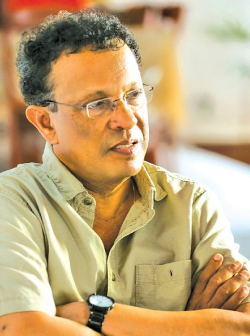
We saw history captured on camera and written down and there were many questions that needed answers. Prof. Ariyaratne Athugala had to shoulder a burden comparable to an Athugala, just like his surname. Soon after graduating from university, he embarked on a long career as a university lecturer. He is now retired.
For teachers and artists, however, there is no such thing as rest or retirement.
Prof. Athugala is a scholar who pushes for and demands change. He raised his voice as a teacher in support of hands-on learning. When someone questioned why pupils were confined to their classrooms, he was the first to set up the required space.
Delicate aspects
“The seeds for a Saho novel were laid even before the movie. As a written assignment, that is. It encompasses the most delicate aspects of life as well as the different youth upheavals I have witnessed throughout my time on campus. These encounters developed into a script. Moving pictures has some inherent absorption.
 |
| Prof. Ariyaratne Athugala |
For instance, in some instances, very subtle emotions, such as love or sexuality, had been absorbed by the film and but only to a certain extent. There are still many things I want to convey. So I think the best way to do this is through a novel. That is how I became involved in a linguistic conflict”.
Saho documents problems on campus. These problems had been permeating the university system for decades. Various creative works have been made on university romance, but deep readings into internal conflicts are still alien to film media. In this space, Prof. Athugala sees more of that internal conflict.
“Although most of these stories are based on campus life, it’s not the popular one we all know.
There are things like politics lurking under the surface. We are talking about the spirit of youth and how society perceives youth. I have spent a long time on campuses and I have seen and experienced many things. This is based on those long-term observations. Even if we take the issue of the Aragalaya, there are separate narratives underlying it. What happened to young Weerasuriya was shocking during my youth. I was thinking about the factors that influenced these events. I tried to discuss it. This is essentially how I communicate those experiences.”
We wonder if audiences would seek answers to the problems plaguing our university system after watching Saho. An artist creates for a specific purpose. It is right to assume that they did so to highlight problems in society. But we wonder if the Professor, who has long served as a teacher and critic, could find solutions to these issues through film.
“I don’t think so. Are there any movies about the university system? Apart from the romance stories, are there any stories that actually depict life on campus? Attempts to capture their deep spiritual and practical thoughts are very few but I have not found any realism in them. Without reading between the lines, they accuse university youth.
 |
| Sandaru ,Harshi, Dasun, Dinara, Niwarthana and Biyanka |
We need to find a dimension where we can see this more clearly within art. This should be discussed using creative media. I am making that effort,” said Dr. Athugala.
For a long time, artists have been trying to change the existing social system through their work. But there is a question if artists have done enough or whether they have created the necessary space to change the social system.
“I really don’t have that much confidence. Sri Lanka lacks creative culture. The enjoyment and consumption of artistic content is also meagre.
Social change will depend on the relationship between these two. Sri Lankan cinema is not in a good place in my view. The amount of dialogue made regarding the clash of ideologies is very low. We have a poor cinema culture. Where are we now? There is no review. No capital. There are very few people who can be called filmmakers. We need to face the problem that arises when that breadth is lost. Even from the university’s point of view, this is very stereotypical.”
 |
| Harshi and Dinara |
In addition to his teaching role Prof. Athugala is also a researcher, an author, a TV show producer and a short film maker. This is his first feature length film. The industry is a sprawling forest. Being embedded in cinema, despite his academic activities, He did not get the opportunity to be a part of it until Saho was completed.
“It is not easy to be a filmmaker in Sri Lanka. There is a hidden hierarchy. There is financial sponsorship on one hand. On the other side are powerbases.
“There are things that were salvaged because of me. Perhaps it is difficult for a beginner to overcome them. Cinematography is dominated by a few people. There is a small but extremely powerful factionalism. I got a lot of support from university students. A group of experienced and skilled professionals also worked with me.”
“I entered the scene very philosophically. But after leaving, it is different ball game, because they do not have that kind of patience. With the budget, the next job comes knocking on your door. They have no meditation with this film. Otherwise, I cannot see myself in my work. But there is no time; no vision. I faced a serious problem on the first day itself.
That meditation is essential for a medium like cinema. If our cinema is to change, the image needs to be nourished not only aesthetically, but also philosophically.
World cinema is out there for the taking but we are in the way. There are reasons. But how can a good movie come out in such a situation?,” he said.
Pain
 |
| Dasun Pathirana |
Artists live with eternal pain in their hearts. These are more subtle than the average person. They are constantly thinking about their subtleties. That pain is mostly released in their work. That’s why these works become the readings of life. That is why they often feel free after venting their emotions.
“I really feel great satisfaction and liberation. I feel that as a teacher, because many theoretical students worked with me holistically”. The way was opened up for them. I am very happy with that. As a work of art, for this movie I received several foreign awards. It won eight international awards for the best film and the best production alone”.
Saho has fetched many foreign awards including Best Asian Feature Film, Best Feature Film, Gold Award Feature Film, Hollywood Golden Awards, Best Independent Feature Film and the Best Independent Feature Film Award.
In addition it also won awards for Best Producer at the Paris Film Awards, Best Feature Film - ARG International Film Festival, Best Director - Robinson Film Awards International Film Festival and Kingdom Honored Independent Feature Film among others. It is commendable that this film has been acclaimed abroad even before its Sri Lankan debut, which will happen soon at cinemas across the island.
